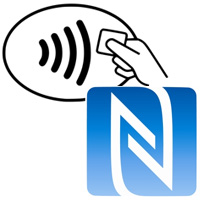While yesterday's buzz was all about Apple's new Apple Watch, I would like to predict that Apple's new Apple Pay payment system in its iPhones will ultimately have a much bigger impact. Journalists at The Globe and Mail and Slate agree. Many attempts at making payments easier have failed—most notably the Google Wallet. Where others have failed, may Apple prevail?

Technologically, the iPhone 6 will be equipped with an NFC (near field communication) chip similar to the one you find in any of the newer credit cards. It allows you to "tap to pay". Apple Pay will make it as easy to pay too, but the process behind it will be much safer. The transaction will take place with a unique one-time payment code that does not reveal any payment information to the merchant. Instead Apple Pay will process the transactions and charge your credit card, which they already have on file with your iTunes account. Apple says that security and privacy are at the centre of their design. Apple promises to never store the details of transactions, keeping transactions private.
NFC technology has made inroads into the credit card business lately. Tap-and-go credit cards with embedded NFC chips are replacing older cards and provide contactless payment at many merchants. Check-out at the grocery store or at your favourite café becomes a lot quicker when you don't have to enter your PIN or print and sign a receipt. Nevertheless, credit card payments have been plagued with data leaks in recent months. As was reported earlier this year, malware installed in Target's security and payments system stole credit card information of 40 million customers. Such crimes have become all too common, and merchants and customers end up paying for it through higher credit card transaction fees and higher store prices. Can Apple do better?
‘Ideally, contactless payment systems should work as simple, convenient, and anonymous as cash.’
The keys to revolutionizing payments systems are security, privacy, anonymity, and convenience. Ideally, contactless payment systems should work as simple, convenient, and anonymous like cash. Despite their convenience, credit card transactions remain costly and insecure. Far too many places store actual credit card information when instead they should only be processing payments. The notion of storing credit card information should become more and more obsolete as technology provides alternatives. Merchants can still obtain information about their customers voluntarily through loyalty programs, a practice that is already in use widely. Smartphones are already making it easier to manager loyalty cards too; apps such as CardStar provide for storing loyalty cards on your phone that can be scanned at check-out counters.
Apple's security concept introduces a number of novel features that make it appear more secure and private than previous attempts at mobile payment. Apple's iPhones have a fingerprint sensor to confirm identity when a phone is used to pay. With single-use cryptographic transaction keys, Apple avoids passing credit card information through merchants' hands. Convenience is a strong element in the process as well. Paying with a smartphone should be quicker than paying cash, and a lot faster than paying with a conventional (non-NFC) credit card.
It probably won't take long before other smartphone manufacturers embrace NFC technology as well. However, Apple will be lightyears ahead because of its iTunes customer base that provides instant access to Apple Pay. But even Apple will run into some challenges that are cultural rather than technical. In countries such as Germany credit card use is relatively low and direct debit payments remain much more popular because of the low transaction cost. Overcoming such cultural hurdles outside North America will be a tall order even for Apple. And the catch with Apple's sophisticated technological solution is that it does nothing to alleviate the concerns about the high transaction cost of credit cards. The success of mobile payment systems also depends on changing the economics of payment systems. At the very least, improved security should reduce the cost of fraud, and help lower transaction costs. If such cost savings can be passed on to merchants and customers, mobile payment systems will indeed revolutionize how we pay.
- Lily Hay Newman: Apple Pay Will Be Much More Important Than the iPhone 6, Slate, September 9, 2014.
- Noel Randewich: Apple gives NFC chip technology a prized seal of approval, Reuters, September 10, 2014.
- Juliette Garside and Alex Hern: Apple iPhone 6 to feature mobile wallet NFC payment system, The Guardian, Tuesday September 9, 2014.
- Jacob Davidson: Apple Pay Is Here — and There's Just One Big Problem., Time Magazine, September 10, 2014.
- Avivah Litan: Will Apple Pay Save Merchants from Data Breaches?, Gartner, September 9, 2014.
- Laura Shin: Why Apple Pay Could Finally Get Us to Shop With our Phones, Forbes, September 9, 2014.
- Mike Isaac: With Apple Pay, a Push Into Mobile Payments, New York Times, September 9, 2014.
- Neil Irwin: Apple Pay Tries To Solve a Problem That Really Isn't a Problem, New York Times "The Upshot", September 10, 2014.
![[Sauder School of Business]](logo-ubc-sauder-2016.png)
![[The University of British Columbia]](logo-ubc-2016.png)